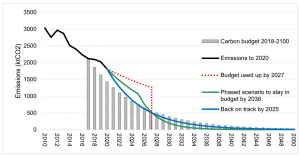Simon, Lauren and Chloe from CEM’s Team Scrutiny discuss the revised Manchester Climate Change Framework. Presented as a draft in July by Sam Nicholson, Director of Manchester Climate Change Agency, the revised framework makes clear how Manchester is failing to stay within the city’s carbon budget for the 21st century. But does it explain why, or propose a viable plan to get back on track?
Technical note: Due to a microphone malfunction, Simon’s voice sounds a bit rougher than normal. Sorry! We hope the content is still as engaging.
In this episode:
- Simon introduces the revised Manchester Climate Change Framework and asks Chloe and Lauren about their feelings [1:13]
- What would MCC or their climate agency say is different between the revised framework and the original? [5:53]
- What was good about the update? [8:12]
- Councillor feedback, what’s next for the carbon budget, and PLEASE find some trackable KPIs (key performance indicators) [11:13]
- Simon describes the headline changes from the updated framework [21:05]
- Over 84,000 homes to be retrofitted
- 21% reduction in energy demand from domestic heating and hot water
- 31% reduction in energy demand from domestic appliances and lighting
- 39% of homes to switch off gas heating to electric heat pumps
- 61% reduction in overall energy demand from commercial premises
- 45% reduction in overall energy demand from institutional buildings
- 58% reduction in overall energy demand from industrial buildings and processes
- 100% of new houses must meet best practice zero carbon standards
- 30% reduction in overall distance travelled
- 20% of journeys to be made by active travel – walking / wheeling or cycling
- 20% of journeys to be made by public transport
- 80% of remaining passenger miles that are by cars, vans and motorbikes need to be in
- electric or hybrid electric vehicles
- 9% reduction in freight mileage and 71% increase in freight fuel efficiency
- Access to 1,500 MW of energy from renewable sources:
- 590 MW from small-scale solar photovoltaics
- 600 MW from large solar photovoltaics
- 310 MW from large-scale offshore wind
- 15 MW from local onshore wind
- 9 MW from large-scale onshore wind
- Lauren, Chloe and Simon describe the new scenarios for the city’s carbon budget [spoiler – they’re frightening] [23:27]

Resources mentioned in this episode:
- MCC’s Environment and Climate Change Scrutiny Committee – landing page
- Watch the meeting on Vimeo
- Read the updated Climate Change Framework (pdf 129kb)
Tell us what you think
We want your feedback, suggestions for areas to focus on in future episodes and ideas for guests to join us. Email our podcast team.

